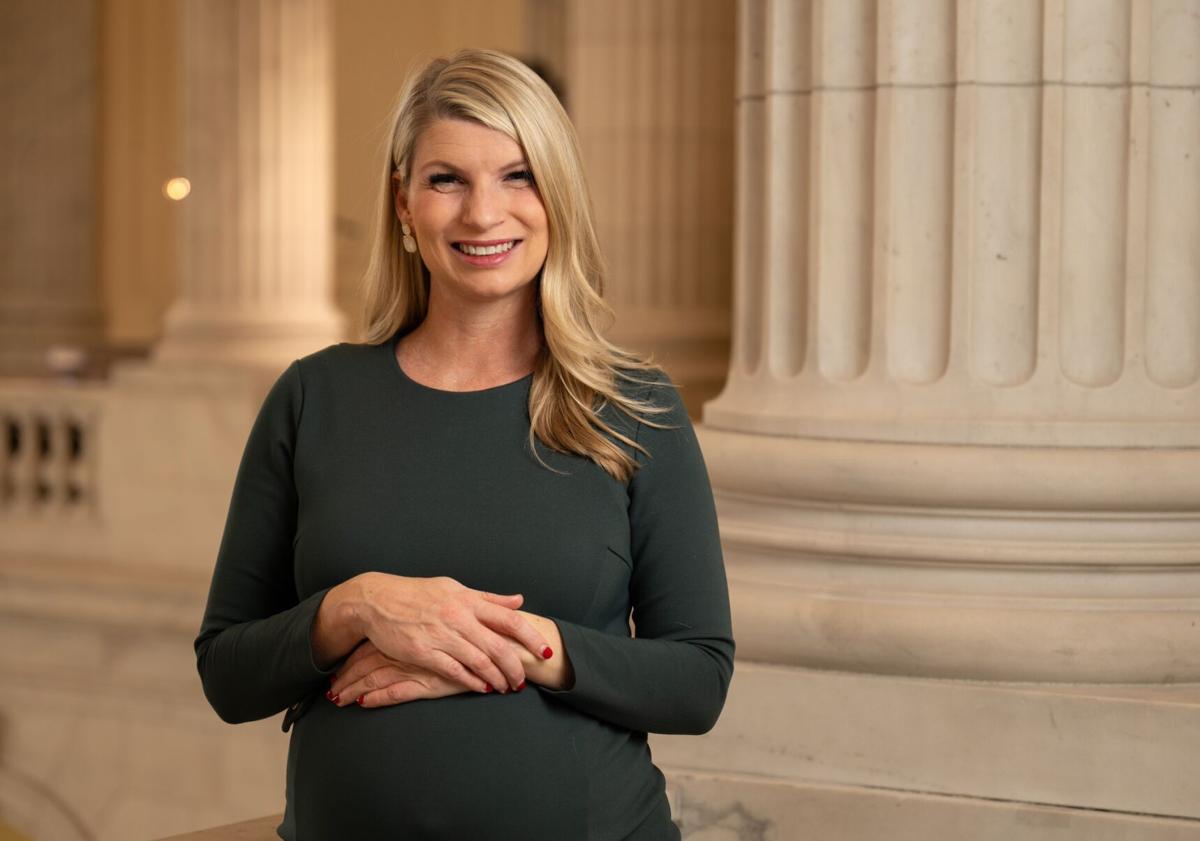Expectant mom Brittany Pettersen vows to push proxy voting for new parents in US House | TRAIL MIX

A very pregnant U.S. Rep. Brittany Pettersen, a Lakewood Democrat serving her second term, poses at the U.S. Capitol in this January 2025 photograph provided by her office. Along with several other young lawmakers, Pettersen is sponsoring a resolution to permit House members who are new parents to vote by proxy.
(Courtesy U.S. Rep. Brittany Pettersen's congressional office)
On Jan. 13, a very pregnant Brittany Pettersen missed the first of what could be weeks’ worth of votes in the closely divided House of Representatives, prompting the second-term Colorado Democrat to renew a plea that the chamber’s Republican leadership permit proxy or remote voting by lawmakers who are new parents.
Expecting her second child in a few weeks, Pettersen returned from Washington to her Lakewood home days earlier and planned to remain there, near her doctor and her family support network, knowing that she’d be unable to cast votes unless the House changed its rules.
“I can’t physically be in DC to vote because I’m unable to fly this close to my due date,” Pettersen said in an email to constituents. “It’s unreasonable that the House refuses to make any accommodations for people who are pregnant or welcoming a new child.”
Noting that she will be only the 13th member of Congress to give birth while in office, and the first from Colorado, Pettersen argued that House rules weren’t written with young families in mind.
That’s why Pettersen and a bipartisan group of young parents-slash-lawmakers introduced a resolution in the opening days of the new Congress to authorize remote voting by proxy for new moms and dads for 12 weeks after the birth of their child. The legislation includes a provision allowing pregnant House members to initiate their proxy voting early if faced with a serious medical condition or travel restrictions.
Along with Pettersen, the resolution’s lead sponsors are Democrat Sara Jacobs of California and Republicans Mike Lawler of New York and Anna Paulina Luna of Florida, who gave birth last year and introduced a similar measure, though GOP leaders let it idle.
Four Republicans and four Democrats signed on as original co-sponsors, including Pettersen’s fellow Coloradan Assistant House Minority Leader Joe Neguse, whose wife gave birth to their daughter shortly before the Lafayette Democrat was elected to his first term in 2018.
In December, the resolution’s four chief sponsors led an evenly divided bipartisan group numbering 16 lawmakers who urged House Speaker Mike Johnson, a Louisiana Republican, to adopt the proposal in the chamber’s rules, but it didn’t make the cut.
“Our government works best when the life experiences of the American people are represented,” Pettersen said in a statement. “Enabling new parents to vote by proxy while they spend time recovering and taking care of their newborn baby is an important step in modernizing Congress and addressing one of the significant barriers young parents face to serving.”
“No parent should have to choose between caring for their child, or recovering from childbirth, and fulfilling their duties in Congress to represent their constituents,” said Luna. “Congress needs to get with the times. This bipartisan proposal is vital in promoting a pro-family Washington, where every American has a voice and the unwavering representation they deserve.”
“Congress needs to get with the times,” said Luna, adding that proxy voting for new parents would promote “a pro-family Washington” that gives all Americans a voice in their government.
Unveiling the resolution, Jacobs fingered outdated House rules as partially to blame for members of the new Congress having the third-oldest average age in the body’s history.
“The House has largely failed to modernize and make changes to be more inclusive, accessible and welcoming to young people, including new parents and soon-to-be parents,” the Democrat said, adding that she delayed starting a family by freezing her eggs during her first year as a House member.
Lawler, whose wife gave birth to their second daughter just over a week before the November election, called parenthood “one of the great joys in life” and said it “shouldn’t prevent members of Congress from being able to vote on critical legislation impacting their district.”
Added the Republican: “As the father of two young girls, I know how important it is to be with your children in those first few weeks. That’s why I’m working in a bipartisan way to establish proxy voting for new parents in Congress — so that new parents can continue to vote while caring for their newborns.”
The day after Pettersen posted about her inability to fly to DC for votes, Johnson made clear he wasn’t gong to budge, telling NBC News that he empathized with female lawmakers “of birthing age” but considered the proposal a “no go” because proxy voting wasn’t permitted under the U.S. Constitution.
“I’ve filed a brief with the United States Supreme Court asserting that proxy vote is unconstitutional,” NBC’s Sahil Kapur quoted Johnson as saying.
Continued Johnson: “That’s been my belief as a constitutional law litigator, and I don’t see any way around that. And it’s unfortunate. I have great sympathy, empathy for all of our young women legislators who are of birthing age. It’s a real quandary. But I’m afraid it doesn’t fit with the language of the Constitution, and that’s the inescapable truth that we have.”
Johnson and more than a dozen other House Republicans signed on to an unsuccessful 2020 lawsuit that sought to overturn rules put in place that year by then-Speaker Nancy Pelosi that allowed for proxy voting during the coronavirus pandemic, and has been unyielding ever since, even though he took advantage of the provision when it was available.
Left unmentioned is the cold, hard math of the GOP’s razor-thin majority in the current House, set to dwindle even further later this month when two Republicans step down to join President-elect Donald Trump’s cabinet. Without Pettersen’s vote, Johnson’s party has a bit more leeway for defections or absences, while Republicans attempt to pass the incoming president’s ambitious legislative agenda.
Pettersen told Colorado Politics on Jan. 15 that she is “disappointed” with Johnson’s comments but vowed to press ahead, pointing out that the constitutional objection raised by Republicans failed in the courts.
“In McCarthy v. Pelosi, the courts routinely dismissed the constitutional challenges to proxy voting,” Pettersen said in an email.
“We are in this situation because of outdated policies and mindsets, not legislative minutia,” she said. “It’s unacceptable that Republican leadership refuses to make the changes necessary to accommodate new parents and ensure their vote is counted. We will keep fighting to allow members to vote for our resolution on the House floor, and unfortunately for Speaker Johnson, we aren’t stopping until it’s passed.”










